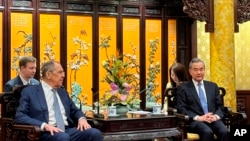Russian Foreign Minister Sergey Lavrov arrived in Beijing on Monday to highlight diplomatic ties and to discuss the war in Ukraine and the situation in the Asia-Pacific region.
The meeting between Lavrov and his Chinese counterpart, Wang Yi, comes as the two countries align on several issues and have increasingly been in disputes with democracies and NATO members.
Lavrov’s visit will last until Tuesday and coincides with the end of U.S. Treasury Secretary Janet Yellen’s four days of talks in Beijing to speak with Chinese officials about economic issues.
Yellen said of her trip that she had “difficult conversations” about national security, including U.S. concerns that Chinese companies have been supporting Russia in its invasion of Ukraine.
Last week, U.S. Secretary of State Antony Blinken said, “China continues to provide materials to support Russia’s defense industrial base.”
Despite maintaining robust economic ties with Russia, China has asserted that it has not been providing arms or military assistance to Russia. On Monday, Chinese foreign ministry spokesperson Mao Ning said that “China has an objective and fair position on the Ukraine issue.”
She added that “China is not a creator or party to the Ukraine crisis, and we have not and will not do anything to profit from it.”
Just weeks before Russia invaded Ukraine in 2022, Russian President Vladimir Putin and Chinese President Xi Jinping signed a “no limits” agreement on the countries’ relationship with each other. Since the agreement, China has supported Russia’s rhetoric surrounding the invasion, agreeing that Western forces provoked the conflict. However, Beijing is formally urging peace talks to end the conflict.
Mao said Monday that Beijing would “continue to promote peace talks in our own way [and] maintain communication with relevant parties including Russia and Ukraine.”
She added that “relevant countries should not smear and attack the normal state-to-state relations between China and Russia … let alone shift the blame onto China and provoke bloc confrontation,” apparently referring to the United States.
Since invading Ukraine in 2022, Russia has faced scores of sanctions, largely isolating the country from the Western world. As a result, diplomatic and economic ties between Moscow and Beijing have strengthened, making Russia China’s fastest-growing trade partner.
In addition to economic cooperation, the two countries have also increased strategic cooperation, holding military drills together and aiming to exert influence on developing nations through a variety of initiatives.
Last month, Chinese vice foreign minister Sun Weidong said Beijing’s ties with Moscow were “at their best in history.”
Some information in this report came from Reuters, The Associated Press and Agence France-Presse.





